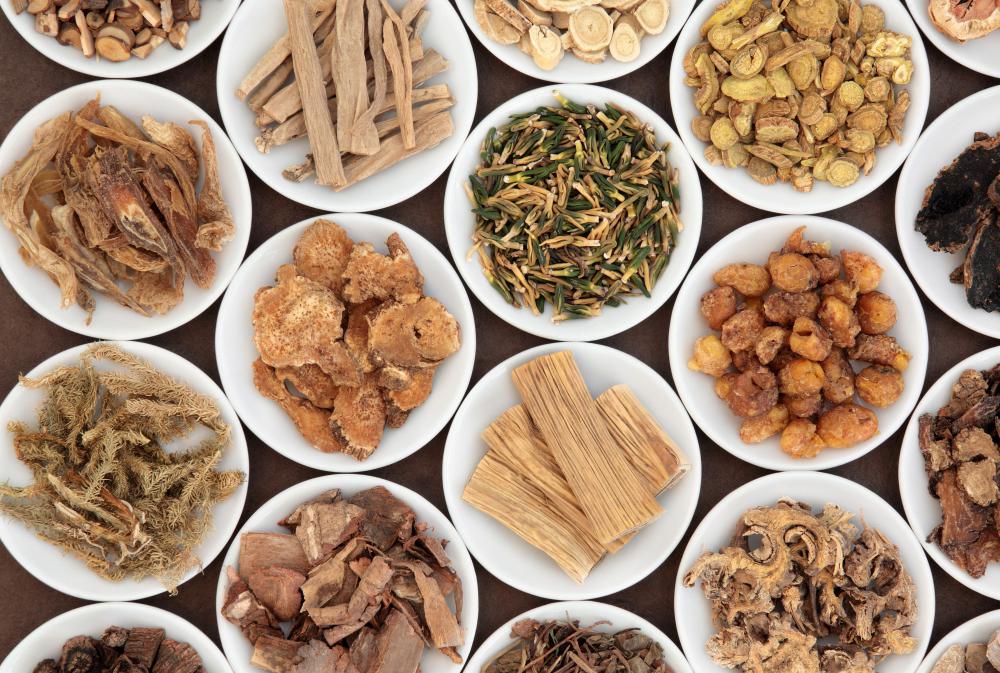At WiseGEEK, we're committed to delivering accurate, trustworthy information. Our expert-authored content is rigorously fact-checked and sourced from credible authorities. Discover how we uphold the highest standards in providing you with reliable knowledge.
What are the Different Types of Chinese Herbs?
Mankind has been using herbs as medicine since the earliest days of human evolution. Eventually, the knowledge and experience obtained was recorded and preserved for future generations. We acknowledge this transition from being gatherers in the wilderness to students of pharmacology as the dawn of medical herbalism. However, different cultures recognize an expanded view of herbal medicine beyond a simple observance of cause and effect from chewing a leaf or sipping an herbal tea. In fact, Traditional Chinese Medicine (TCM), one of the oldest systems of medicine, embraces the use of traditional Chinese herbs as a complementary component of a holistic mind-body approach to wellness.
One of the earliest medical texts to describe the doctrines of TCM was the Huang Dei Nei Jing, which dates to approximately 475 B.C. From this document emerged the basics of various diagnostic methods central to TCM, such as the five element theory, and the duality concept of masculine and feminine aspects (i.e., yin and yang). Later, various Chinese materia medica provided an understanding of how Chinese herbs correspond to these theories and herbology was introduced, which is the science of designing herbal formulas according to the patient’s yin/yang status.

One of the oldest known texts specific to Chinese herbs was the Shennong Bencao Jing, which dates to the Han dynasty. The author by the same name is also credited as being the first herbalist in Chinese medicine. Legend has it that Shennong sampled hundreds of Chinese herbs to learn their properties, many of which were highly toxic. This particular work is reputed to describe at least 365 medicinal formulations, with more than 250 being detailed as Chinese herbs.

In contrast to Western botanical medicine, all the parts of Chinese herbs are typically used rather than just the leaf or root. Another distinction is that Chinese herbal medicine often incorporates non-botanical components into its formulas, such as animal fur, organs, and bones. However, since obtaining some of these ingredients poses a threat to various endangered species, this practice has largely been discontinued.

Chinese herbs are traditionally classified according to three criteria: The four natures, the five tastes, and the meridians. The four natures relates to the degree and orientation of yin/yang aspects, ranging from very cold (extreme yin) to very hot (excessive yang). The five tastes, sweet, sour, bitter, salty, and pungent, indicate medicinal merit of the plant based on which taste it yields. Finally, how the herb corresponds to the meridians (energy channels) of the body is determined by the biological activity the herb exerts on the body systems and organs.
While some Chinese herbs may be unfamiliar to Westerners, others are commonly known but by different names. For example, garlic is well known as a medicinal herb in Western medicine, but in Chinese medicine it’s referred to as dasuan. Aloe, a popular house and garden plant that produces a burn-soothing gel, is called luhui in China.
AS FEATURED ON:
AS FEATURED ON:













Discussion Comments
In some ways, I feel that (Chinese) herbs are even better than some of the medicines that we (Westerners) use in this day and age. I'm not saying that there's anything wrong with what we use, but on the other hand, most (if not all) Chinese herbs are completely natural. On the other hand, some (American) doctors are so fixed on trying to create the perfect vaccination, that in the end, it ends up becoming way too processed. Does anyone else feel this way?
Not only is this article a great read, but I also learned something very interesting. Being an American, I'm obviously familiar with garlic, but I didn't know that the Chinese use it as well, and under a completely different name. It really makes me wonder what else we use that the Chinese are also familiar with.
Some Chinese herbs may be very strong and bitter, but they sure are helpful. For example, herbal medicine and herbal tea aren't exactly a favorite of Westerner's, but it helps them to feel a whole lot better in the end. In fact, in comparison to Americans, I wonder how much more accustomed the Chinese are to their salty and pungent herbs?
Post your comments